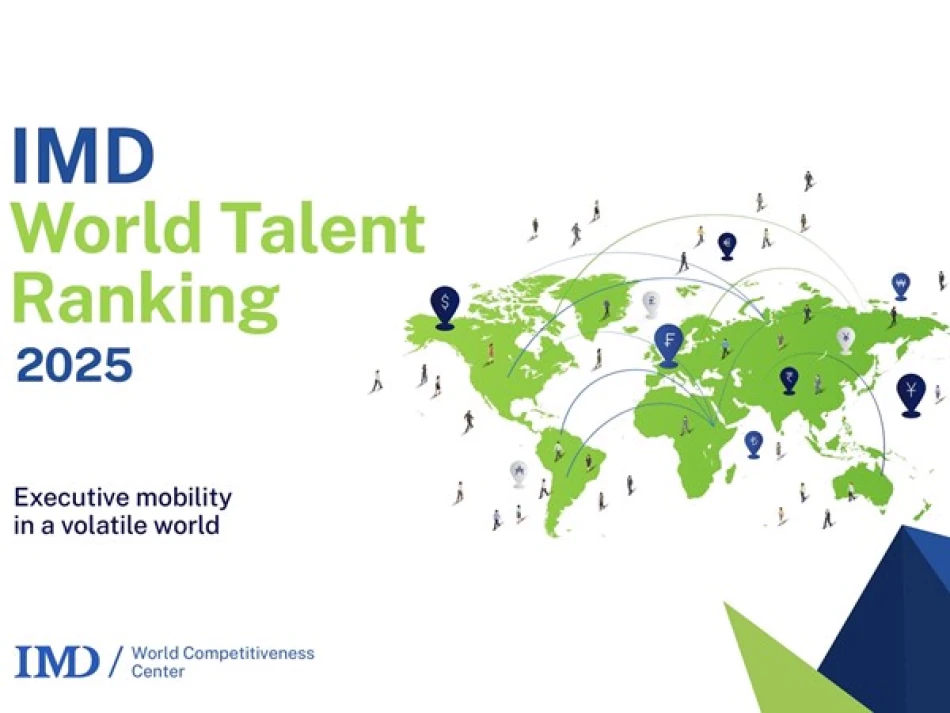
UAE Leads Regionally, Ranks 9th Globally in World Talent Report 2025
UAE Breaks Into Global Top 10 for Talent Competitiveness, Outpacing Germany and Canada
The United Arab Emirates has achieved a landmark milestone by entering the global top 10 for talent competitiveness for the first time, jumping eight positions to rank 9th worldwide in the 2025 World Talent Report. This dramatic rise positions the UAE ahead of traditionally talent-rich nations including Germany, Canada, Finland, Austria, and Norway, signaling a fundamental shift in how global talent views the Middle East as a destination for career advancement and investment.
A Strategic Victory in the Global Talent Wars
The UAE's ascent to 9th place among 69 global economies represents more than statistical progress—it reflects a calculated transformation of the nation's economic infrastructure. With a score of 77.86 points, the Emirates secured first place globally in five competitive indicators and landed within the top 10 for 15 different metrics across the report's main categories.
This achievement comes at a critical time when nations worldwide are competing intensely for skilled workers, particularly in technology, finance, and innovation sectors. The UAE's success suggests that its decade-long strategy of economic diversification and talent attraction is paying substantial dividends.
Dominating Key Performance Metrics
The UAE's performance was particularly striking in the "Readiness" category, where it claimed the top global position. This metric evaluates the availability of skills and competencies in the labor market—a crucial indicator for multinational corporations considering regional headquarters locations.
The nation also secured 12th place globally in the "Appeal" category, which measures countries' ability to attract and leverage international talent. Perhaps more significantly, the UAE advanced six positions in the "Investment" category, reflecting improved development of national competencies.
Five Global Championships That Matter
The UAE achieved first place worldwide in several telling categories: lowest personal income tax collection, workforce growth, availability of global expertise, competent senior managers, and inward mobility of higher education students. These victories paint a picture of a nation that has successfully created both fiscal incentives and educational infrastructure to attract global talent.
The country's second-place global rankings in high-skilled foreign workers and financial skills, combined with third-place positions in student-teacher ratios, health infrastructure, and availability of skilled labor, demonstrate comprehensive strength across multiple talent dimensions.
The Singapore Playbook in Action
The UAE's strategy mirrors successful approaches pioneered by Singapore and Switzerland—combining tax advantages with world-class infrastructure and business-friendly policies. However, the UAE has added its own innovations, particularly in creating specialized economic zones and offering long-term residency programs for skilled professionals and investors.
This approach contrasts sharply with traditional talent hubs like Germany and Canada, which rely more heavily on social benefits and established educational institutions but may be hampered by higher tax burdens and more complex bureaucratic processes.
Market Implications and Investment Opportunities
For international businesses, the UAE's talent ranking surge signals reduced operational risks and improved access to skilled workforces. Companies establishing regional operations can now point to objective data supporting the UAE's competitive advantages in talent acquisition and retention.
The financial services sector stands to benefit particularly, given the UAE's second-place global ranking in financial skills. This positions Dubai and Abu Dhabi to compete more aggressively with established financial centers like Hong Kong and London, especially as geopolitical tensions affect traditional hubs.
The Brain Drain Reversal
The UAE's eighth-place global ranking in "low brain drain" represents a significant achievement for a relatively young nation. This metric suggests the country is not only attracting talent but retaining it—a crucial factor for sustainable economic development and knowledge transfer.
This retention success likely stems from the UAE's combination of career opportunities, quality of life (also ranked 8th globally), and long-term residency options that provide stability for expatriate families.
Challenges and Future Trajectory
Despite these achievements, the UAE faces ongoing challenges in developing indigenous talent pipelines and reducing dependence on expatriate expertise. The country's success in attracting global talent must be balanced with investments in local education and skill development to ensure long-term sustainability.
The report's methodology, based on 31 indicators including surveys of over 6,000 senior executives alongside statistical data, provides credible validation of the UAE's progress. However, maintaining this momentum will require continued investment in infrastructure, education, and policy innovation as other nations adapt their own talent attraction strategies.
The UAE's breakthrough into the global talent top 10 represents a strategic victory that extends far beyond rankings. It positions the nation as a serious competitor in the global knowledge economy and validates its transformation from a resource-dependent economy to a diversified, talent-driven hub. For investors, businesses, and skilled professionals worldwide, the message is clear: the UAE has fundamentally altered the global talent landscape.
Most Viewed News

 Layla Al Mansoori
Layla Al Mansoori






